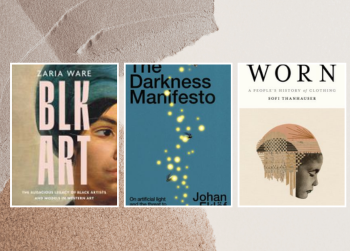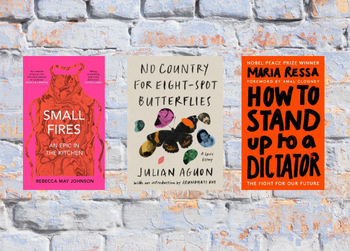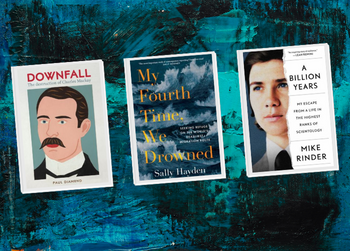What did the production of clothing look like before this era of fast fashion? Is the physics of matter a little bit magic? What have we lost as the world’s natural dark recedes in the glare of all our artificial light? You can discover the answers to such questions (and more!) in the recent picks below. Other items of interest include a portrait of the convergence of two lives in Homelands, an art forger’s remembrances and trade secrets in Con/Artist, and an analysis of New Zealand’s extremist underbelly in Fear by Byron C. Clark. And as ever, remember that you can browse all new non-fiction items here and filter by topics of your choosing.
Homelands : the history of a friendship / Ramaswamy, Chitra
“A book about history, friendship, family and what it means to belong, from the award-winning journalist and author of Expecting. This book is about two unlikely friends, one born in 1970s Britain to Indian immigrant parents, the other arrived from Nazi Germany in 1939, fleeing persecution. It is a story about common ground, about migration, anti-Semitism, racism, family, belonging, grief and resilience. This book is about the past and the present. It is about the state we’re in now and the ways in which we carry our pasts into our futures.” (Adapted from Catalogue)
The magick of matter : crystals, chaos and the wizardry of physics / Flicker, Felix
“Condensed matter physics is what happens when atoms cluster together to make something of a size we can understand – something like a car, say, rather than a galaxy. It’s what makes things hover in mid-air (magnetic levitation) or crystals glow (thermoluminescence). It’s also what we mean by magick. Join Felix Flicker on an empirical adventure in condensed matter physics, the scientific mechanism behind the mysteries of alchemy, transmogrification, and much more. From the laws of thermodynamics to the seven bridges of Konigsberg, The Magick of Matter is a journey of discovery which will upend everything you think you know about witchcraft, wizardry, and condensed matter physics.” (Adapted from Catalogue)
 Blk art : the audacious legacy of Black artists and models in Western art / Ware, Zaria
Blk art : the audacious legacy of Black artists and models in Western art / Ware, Zaria
“Black people have been a part of the Western art world since its beginnings. Quietly held within museum and private collections around the world are hundreds of faces of Black men and women, many of their stories unknown. From paintings of majestic kings to a portrait of a young girl named Isabella in Amsterdam, these models lived diverse lives while helping shape the art world along the way. Then, after hundreds of years of Black faces cast as only the subject of the white gaze, a small group of trailblazing Black American painters and sculptors reached national and international fame, setting the stage for the flourishing of Black art. BLK ART is an essential work that elevates a globally dismissed legacy to its proper place in the mainstream art canon.” (Adapted from Catalogue)
The darkness manifesto : how light pollution threatens the ancient rhythms of life / Eklöf, Johan
“How much light is too much light? Satellite pictures show our planet as a brightly glowing orb, and in our era of constant illumination, light pollution has become a major issue. The world’s flora and fauna have evolved to operate in the natural cycle of day and night. But in the last 150 years, we have extended our day – and in doing so have forced out the inhabitants of the night and disrupted the circadian rhythms necessary to sustain all living things, including ourselves. In this persuasive, well-researched book, conservationist Johan Eklöf urges us to appreciate natural darkness, its creatures, and its unique benefits. Educational, eye-opening, and ultimately encouraging, The Darkness Manifesto outlines simple steps that we can take to benefit ourselves and the planet.” (Adapted from Catalogue)
Worn : a people’s history of clothing / Thanhauser, Sofi
“In this ambitious, panoramic social history, Sofi Thanhauser takes us from the opulent court of Louis Quatorze to the labor camps in modern-day Chinese-occupied Xinjiang. We see how textiles were once dyed from lichen, shells, bark, saffron, and beetles, displaying distinctive regional weaves and knits, and how the modern Western garment industry has refashioned our attire into the homogeneous and disposable uniforms popularized by fast fashion brands. Drawn from years of intensive research and reporting from around the world, and brimming with fascinating anecdotal material, Worn reveals to us that our clothing comes not just from the countries listed on the tags or ready-made from our factories – it comes, as well, from deep in our histories.” (Adapted from Catalogue)
Fear : New Zealand’s hostile underworld of extremists / Clark, Byron C.
“Speaking after the chaos of the protest that stopped the nation, Prime Minister Jacinda Ardern told a press conference, ‘One day, it will be our job to try and understand how a group of people could succumb to such wild and dangerous mis- and disinformation.’ That day isn’t in the future. Mis- and disinformation had been identified as a problem before the convoy to parliament had even been suggested. While that protest looked like something that ‘couldn’t happen here’, things that supposedly couldn’t happen here seemed to be happening with alarming frequency. We are no longer living in ordinary times, where political violence is unimaginable, and conspiracy theorists are marginal figures whose ideas can be laughed at. How did things get to this point?” (Adapted from Catalogue)
Women in white coats : how the first women doctors changed the world of medicine / Campbell, Olivia M.
“Women in White Coats tells the remarkable story of three Victorian women who broke down barriers in the medical field to become the first women doctors, changing how women received health care. In the early 1800s, women were dying in large numbers from treatable diseases because they lacked accessible, humane medical care. Motivated by personal loss and outrage, these three women faced countless obstacles and prejudices while earning their medical degrees and paved the way for others to do the same. With gripping storytelling based on extensive research, Campbell tells the courageous history these women made by becoming doctors, detailing the boundaries they broke to reshape how we receive medical care today.” (Adapted from Catalogue)
Con/artist : the life and crimes of the world’s greatest art forger / Tetro, Tony
“The world’s most renowned art forger reveals the secrets behind his decades of painting like the masters – exposing an art world that is far more corrupt than we ever knew while providing an art history lesson wrapped in sex, drugs, and Caravaggio.” (Catalogue)





